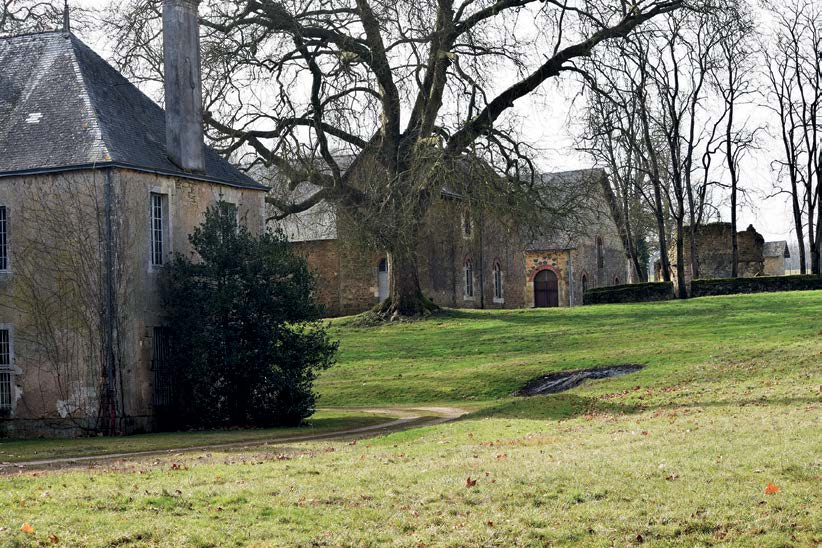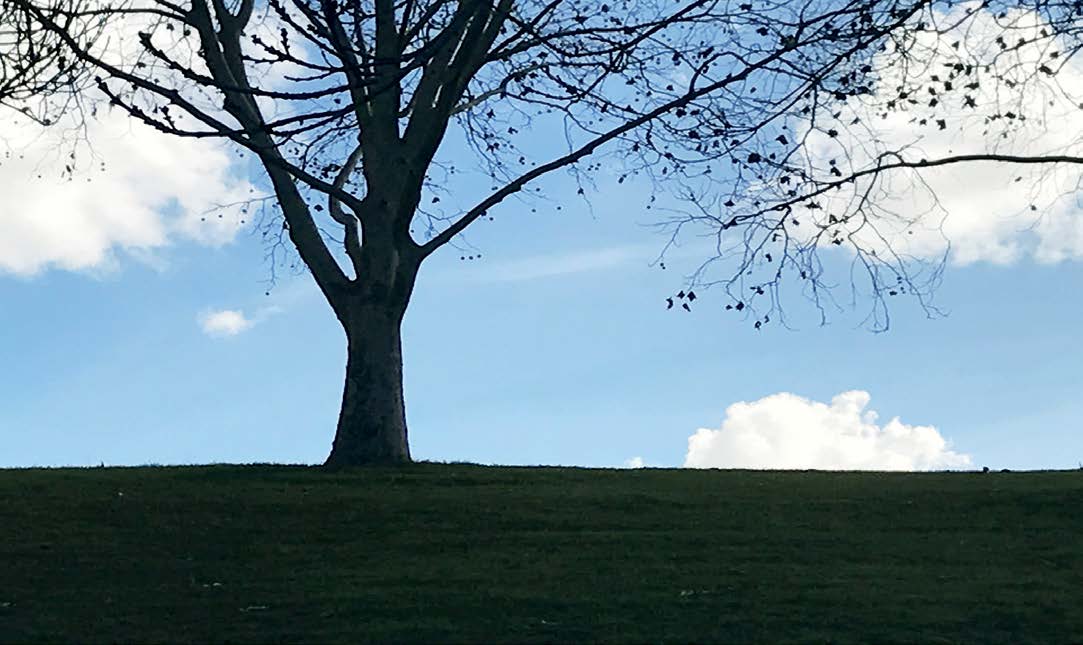Average city noise today often reaches 70 decibels which is equivalent to being in a room with a loud vacuum cleaner. As most people in the world now live in cities, we are becoming acclimatised to noise, just as animals like foxes, which used to be entirely rural, are now becoming urbanised. Urban evolution means accommodating ourselves to the noise of traffic, planes, subway trains, construction, fridges, leaf blowers noisy neighbours and ever-louder muzak in elevators and restaurants. Research indicates that getting used to such noise levels is harmful. It is a form of pollution causing insomnia, depression, aggression and isolation. Noise is more than a nuisance. It is a serious problem – and not only for meditators who naturally seek quiet and generally feel a deep appreciation and need for silence.
I have been leading several long silent retreats recently. Travelling between them, I became more than usually sensitive to the noise in modern life that we take for granted. Exposure to it also effects us when, like Jesus, we withdraw to a quiet place to pray. Arriving in a truly quiet place, like Monte Oliveto where we have just finished the twenty-seventh annual weeklong silent retreat, can at first be a shock. We wait for familiar levels of loud noise and, at first, can feel a sense of absence, even of loss, when they don’t come. Then we notice there are sounds. Not noise. But sounds, natural sounds. There is birdsong, a quite excited sound when you really listen to it and full of meanings we can’t decipher; and insects, the constant background sounds of summer days and nights; and the wind in the trees; and the church bells that sound loudly during some of the meditation sessions but surprisingly don’t distract or annoy the roomful of meditators. Then there are human sounds, a sneeze, cough, physical movements, which also don’t bother you provided they are natural and considerate. Noise is unnatural and doesn’t care what it disturbs. It feels it has right of way and always claims it. Sounds reach us subtly from the great silence of nature and then draw our attention to it.

As we adjust to a silent place and its natural sounds, we become aware, in the absence of outer noise, of the constant level of our own inner noise. We can’t blame the neighbours or the traffic for that. This is the point where the work of silence begins. We are so habituated to our inner noise that we unconsciously seek to sustain it. We reach out for new input and sensestimulation. The most obvious sign of this is the psychic umbilical cord we have grown with our mobile phones. We turn our attention to them addictively for stimulation and distraction, to keep on consuming. If there are no messages we play a game. The subtle spaces of silence and solitude that existed in the past, when we walked down the street or waited for a bus or a dentist appointment have been sucked away by the daimon, the other self we think we find in the phone.
Distraction has always been with us in the human condition. The Desert monks thought of it as our original sin, the fall from pure attention. It is the growing intensity of inner noise that is our present crisis. We are worse off, not completely different from our predecessors; but this means we can find in the past a wisdom to apply to the conditions of modern life.
God is delight and those who are faithful are in God, called home from the noise that is around us to the joy that is silence. (St. Augustine, De Trinitate)
St. Augustine, De Trinitate
Augustine asks ‘why do we rush around searching for God who is already here at home with us? If only we would be with God’. The resistance to silence is built into the human attraction to noise. Even when we thirst for silence and want to ‘come home’ to ourselves, there is a corresponding impulse to jump up and run away back into distraction.
The first part of the work of silence is to become comfortable with ourselves. Facing down the restlessness and fidgetiness that transfers from mind to body, we gradually discover that we have a friend to trust and whom it is pleasant to be with – in ourselves. As with most friends, we tend to idealise, even idolise them at first and then learn that their faults and failings are part of their attractiveness. Similarly we come to recognise our own problems and self-contradictions as part of what makes us loveable. We pass from shame and guilt in relation to ourselves, from an obsessive need to be better and succeed more, to an ease and amused affection for ourselves which actually permits improvement to take place more naturally.
A Buddhist teacher once told me how surprised he was by the level of self-rejection and low self-worth he found in his western students. He saw it as their biggest impediment to spiritual development. This self-alienation is at the root of so much of the loneliness and inability to make sustained intimate commitments in our culture. It sets up high levels of incessant inner noise. This then blocks out the sound of silence that comes to us, with healing beauty, in all the natural sounds and sights of the world. Our inner noise disrupts our senses and the sense we make of them.
A long-term international research project, called Breakthrough Listen, is surveying one million of the nearest stars and one hundred of the closest galaxies. It is listening for signs of intelligent life ‘out there’ and its technology is sensitive enough to pick the equivalent of an aircraft radar. What if we were also to listen to the silence in which sounds travel? We might recall our own lost spiritual intelligence ‘in here’.
The work of silence is listening. By listening to the silence we are drawn into love with it, we find it to be friendly not fearsome, and we ourselves begin to become silent. Reflecting on this experience theologically, we can say it is part of the human process of divinisation, of becoming ‘like him, because we shall see (and hear) him as he truly is.’
We can begin this work of listening anywhere, anytime. In the street or in your room. At a business meeting or at a meditation group. At first, by attentively listening even to the noise, you shift from distraction to stillness. You will then begin to see the difference between the noise and those natural sounds that make us aware of silence. This is the practice of the presence of God that we can do anywhere – for some, more easily in the supermarket than in church.
Silence brings us directly, not always easily, to self-knowledge
The important thing is to keep listening. The mind may think it is waiting for a message arriving in a big noise or shattering ‘experience’. Like Elijah in the desert we have to discover that God is not in the strong wind rending mountains, nor in the earthquake or the fire, but in the ‘still small voice’. This progression suggests the growing sensitivity of the mantra as we move over time into more subtle levels of saying – and listening – to it. When Elijah heard the still small voice he went out of his cave to get a glimpse of God and also to experience the life-changing question ‘what are you doing here, Elijah?’
We are not listening for messages telling us what to do, relieving us of the responsibility for our own existence. In the work of silence we meet the answers we are looking for in the form of intimate and inescapable questions. Strangely, these questions bring us more comfort – and courage to change – than any answer. We can always question answers. But the question that is an answer is truthful. Silence brings us directly, not always easily, to self-knowledge. It propels us out of self-absorption and our noisy self-conflicts. Whenever we move to a new degree of self-knowledge we change: values, how we spend our time and money, our priorities, our perception of the world. The work of silence brings us closer to ourselves. It also propels us into the vast interstellar spaces, as all the mystical traditions teach. This is from Attar, the Sufi:
Ours is a way you cannot understand. Each moment of this quest a person must eel his soul is spilled and unremitting zeal should force him onward at whatever cost. The one who pauses on our path is lost.
The Conference of the Birds
It is a mark of a genuine spiritual teaching – not a consumerist one that looks for good sales figures – that it emphasises this need for perseverance. Jesus said ‘no one who starts to plough and looks back is fit for the Kingdom of God.’ Of course, we all look back, with longer or shorter glances, and want the silence to be crowded out again by noise. But when we return to the work we are fitter for the kingdom and we understand the path better. The latest Chinese supercomputer can perform 93 quadrillion calculations per second. Even this, however, could reach its limit one day. The human heart has no limit to what it can know. The more it loves the greater its capacity – as we can see in parental love for example. This is a way to understand ‘eternal life’ – not as an unrelenting extension of a linear dimension but the capacity in this life with all its limitations, to experience boundlessness. Suzuki, the Zen master called it a ‘void of inexhaustible contents’. St Paul speaks of what no eye has seen, what no ear has heard, and what no human mind has conceived: the things God has prepared for those who love him’.

Our ordinary minds, however, do have limited capacity. Our interior noise, self-reflection, monologues and conversations, anxieties and fantasies, take up space and, if we don’t delete a lot, it will lead to burnout. Modern stress points to the inability to pause and restore in ourselves the essential rhythms of healthy existence. With 300 hours of YouTube videos uploaded every minute, anyone today who spends time online has to avoid mental saturation by discovering what it really means to be an ascetic. Asceticism is the exercise of intelligent self-control for the purpose of greater joy and fuller experience of life. The work of silence is the essential ascesis for modern people. It is not a deprivation but a breakthrough. It takes us beyond the echo chamber of our interior noise. By learning to listen we discover the healing nature of silence – and its innate happiness.
By becoming silent we listen in all aspects of life with greater precision and other-centredness.
Intimacy with self, which is selfknowledge, is necessary for intimacy with others and with God. Intimacy – such a conscious and painful need of our time – begins from within by reducing noise and allowing us to feel at home in and with ourselves without constant external stimulation. When we meet the great silence in solitude we are empowered to come closer to others in the detachment that comes with listening.
To help this work of silence to become part of life we need to acknowledge our practical need for help. These needs have daily, weekly and annual rhythms. There are daily aids we can use – our own Daily Wisdom email, for example – which give a friendly nudge to remember and make space for the work of silence today. There is daily lectio, reading the gospel, or some daily readings like John Main’s Silence and Stillness in Every Season. The weekly meditation group is a powerful help and builds a sense of community and friendship with others on the same path. Every meditator trying to deepen the work of silence would also do well to make an annual retreat, to clean and service their interior life. Pilgrimage to places of sacred silence where there is palpable presence is an enjoyable and increasingly popular way of supporting and deepening the work.
I feel Bonnevaux, where the work of silence was carried out daily for centuries, is going to be a place where people will find peace and the lovingkindness for others that flow from true silence. We have recently been talking of the three levels of silence that will combine there – the hospitable silence of the core community, the silence of the conferences and dialogues that will bring a contemplative mind to the challenges of our world and the silence of the hermitages and longer retreats. As the work of silence leads us to solitude and selfknowledge, it simultaneously leads into community with those, like us, whom we recognise as soul-friends.
In Silence – the book by Shusaku Endo and now an acclaimed film by Martin Scorsese – a Portuguese Jesuit missionary to Japan during a period of ruthless persecution encounters what he calls the awful silence of God. He waits for a message from God about the cruel suffering the Christians are undergoing. No such intervention arrives that would give meaning to their ordeal and the ‘silence of God’ becomes a dark, negative force blocking out the natural sounds of silence from the natural world.
Behind the depressing silence of the sea, the silence of God…the feeling that while men raise their voices in anguish God remains with folded arms, silent.
“The work of silence and understanding the meaning of silence has never been more urgent for humanity”
This is an ancient human, preChristian, complaint about God based on an imaginative understanding that defeats its own purpose. It is not uncommon for people on meditation retreats to raise this problem as they work towards a new understanding of God and insight into the nature of silence. Fr Rodriguez, in the book, is a good man, though vain in his priesthood and obstinate in his image of God, who endures the ‘sickening’ silence until it crushes him and destroys his faith – at least, the kind of faith he had been clinging to.
His own noisy, religious ego had blocked out real silence, including the sounds of silence manifesting the beauty of the world and carrying us into the true silence of God. He seems estranged from the contemplative wisdom of his own tradition that tells us ‘there is nothing so much like God as silence’. When we are deafened by our inner noise we easily mistake this for silence, although it is its opposite.
It gives silence a bad name – a fearful, distasteful, false silence. In the same way a glaring light from a camera phone that you unfortunately look straight into can disturb our vision of what is before us.
By contrast with Fr Rodriguez, Etty Hillesum saw the nightmare scenarios of the Holocaust close up – a world that was filled with the worst kind of noise. It led her, however, to find God in the midst of it, to see and listen to the beauty of creation around them. Instead of complaining, she strove to protect the space that God needs and that we need God to have. She found silence as prayer and prayer as silence.
I’ll turn inward for half an hour each morning before work and listen to my inner voice. Lose myself. You could also call it meditation…A quiet half-hour within yourself…But its not so simple that sort of quiet hour. It has to be learned. A lot of unimportant inner litter and bits and pieces have to be swept out first – irrelevant distractions, the clutter is ever present.
The work of silence makes us hear the noise of our inner clutter. But if we understand and come to love the work we will not be discouraged by the distractions.
The goal of meditation is not just to develop a quiet mind. That is a natural and desirable result. But the real goal is to discover our silent mind, the silent nature of our being. Many people start with the limited first goal and discover the big goal. Many also, especially those trying to do it all on their own, give up just as they are about to make the breakthrough.
The big watershed is becoming aware that we need to let go of all that we hitherto understood to be thought. ‘Wait without thought, T.S. Eliot said, because thought would be thought of the wrong thing.’ Gradually – but with occasional flashes of understanding – we come to understand why the ‘monk who knows that he is praying is not truly praying and the monk who does not know that he is praying is truly praying.’ At first this sounds like something weird or frightening. Later, it is seen as the proclamation of the greatest human freedom.
The work of silence and understanding the meaning of silence has never been more urgent for humanity. Science and technology have worked miracles, reduced suffering and brought cultures closer together. But the speed of change has led to overwhelming noise and blurring of vision. We have not yet learned the self-control necessary to master our own devices. We live in a ‘post-truth world’, where political manipulation occurs in bursts of 140 characters. A very high volume of noise and distraction is needed to maintain the posttruth era. The contemplative mind is, in social as well as mystical senses, a means of liberation and survival.
No wonder John Main places the work of silence at the heart of his teaching and urges us to:
Make time available every morning and evening of our life. During that time be open to the light, to God, to love. Not thinking our own thoughts, or planning our own plans, but entering into an ever more profound silence as our being becomes rooted in God.






